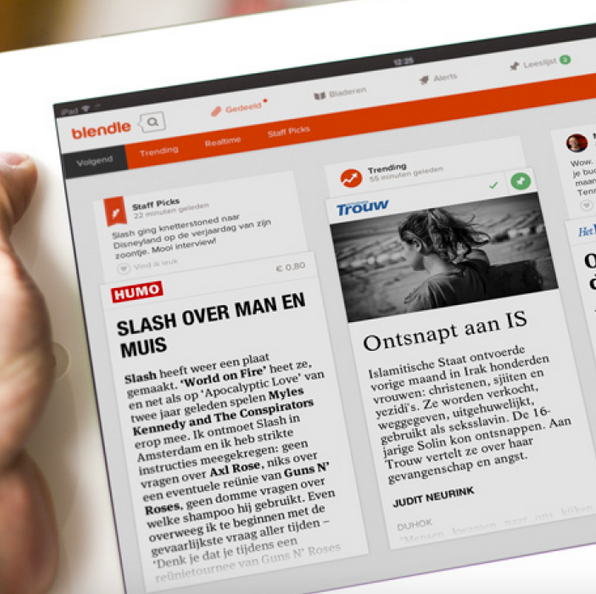by Philip Di Salvo – translated by Roberta Aiello
Article first published here and reproduced with the kind permission of Wired Italia

Alexander Klöpping, the twenty-seven year old co-founder of Blendle, explains his recipe for a digital business model that works. He will be a speaker at the International Journalism Festival in Perugia which will be held from 15 to 19 April.
Among the many who are trying to find a business model that works for online journalism, Blendle, a Dutch startup, has proposed one of the most interesting ideas to answer the simple question of how to make readers pay for online journalism.
The answer is simple and attentive to the needs of readers; by providing a unique website, with single access, to read all the articles of the available newspapers, paying for each piece that is read. A tempting approach, the one of micropayments that Blendle has managed to push through in the Netherlands, where several newspapers have successfully embraced the project with 200 thousand subscribers. For the startup of Utrecht, now it is time to look beyond national borders, preparing for its arrival in other countries, thanks to the interest of publishers like Axel Springer (Germany) and the New York Times, which have invested in this idea.
In anticipation of the International Journalism Festival in Perugia (15-19 April), where he will be speaker on two panels, we asked Alexander Klöpping for his perspective on contemporary journalism and the recipe of his company for finding a digital business model that works.
Alexander, Blendle has often been defined as the “iTunes of journalism,” a definition which you agree with. Can you explain what you mean and what does Blendle do?
“We think that buying online journalistic content from a newspaper now is simply too complicated. Every newspaper has its paywall and it is really hard to find what you need or what is relevant to you. What we do is to provide a unique website where all the newspapers of your country can be read with only one account that works for everyone. Our system also makes it easier to find interesting things thanks to suggestions from friends and famous people or on the basis of what is successful on social. And, of course, from flipping through all available newspapers on Blendle.”
What is possible to find on Blendle? Exclusive content that can only be found there?
“We collect all the content that publishers make available: there is also some premium content, which usually comes from the paper editions of newspapers. The outlets involved use different ways to monetize online, so it is difficult to give a general and unambiguous answer. Basically, all the articles of the outlets are available on Blendle. Paper premium content, as well as, online paid content. You can read it all.”
How does Blendle’s business model work? How do you manage the revenue with publishers who are your partners?
“Actually, it works in a very simple way. On the basis of agreements 70-30: the big part goes to publishers, while we keep 30% of what we cash.”
Presently, you are active in the Netherlands, but you received funding from major German and American publishers. Do you think that your model can be implemented elsewhere? Are you planning to expand abroad?
“Just this month we will announce the expansion into a large European country, our first step abroad after ten months of activity in the Netherlands. This year we will also launch an international English version. We will have a number of high profile newspapers involved, certainly the Washington Post and the New York Times will become members.”

Someone has criticized the fact that your system is working well in a country like the Netherlands but is not intended to replicate the same success in English, because of the large number of available outlets and the breadth of available free offer in the same language. How do you answer this criticism?
“I think we need to try. Really, it’s difficult to navigate between all these paywalls and manage them simultaneously, and this applies to the Netherlands as for publications in English or other languages. The annoyance is the same and for example, it is much easier to buy Angry Birds than an article from the Wall Street Journal. People still love very renowned journalistic brands such as the Wall Street Journal or the New York Times. We think that solving the problem of access and of the content discovery is useful in any language area.”
Are you also planning to arrive in Italy?
“We currently do not announce other countries because to start Blendle abroad always depends on how much interest we attract. We are talking with publishers in Italy but a possible launch depends on the level of enthusiasm that we get from potential partners. Blendle needs to be launched with a large number of involved partners and when we have this condition in Italy, we will start with pleasure. However, we are not ready at this time.”
We often discuss what the business model of the future of journalism will be, and perhaps we will not have just one. How do you see Blendle within this debate?
“I think there are always multiple approaches. I don’t think the idea of subscriptions will disappear, for example. The same as for crowdfunding and membership. All these things will remain. At the same time, however, I think that micropayments for journalism have never been applied at their best. There have been some interesting experiments but it is not yet enough. For mobile games, for Android and iOS, for example, it is a common thing, but not for news. Experiments of journalism like this have often been very poor and I think this is not due to the fact that micropayments do not work, but on the contrary this is because the execution does not work at its best.”
What makes Blendle better than others?
“One thing that works well on Blendle, for example, is the opportunity to be refunded if an article is not appreciated. It seems a strange or little thing, but it is actually crucial for users not having to take final decisions on the payment. We open the article to the user and then he decides whether to close it within 10 seconds to get the money back right away or if get it at the end. In this way the reader always knows that he can be refunded and this makes paying for online journalism even more convenient and works extremely well in our case. As I said before, micropayments have never been done well in journalism, I think we are doing a good job and we are only at the beginning. I am sure that micropayments will be a crucial method for financing journalism in the future. They are already crucial for games, I do not understand why it should not work for news.”
The aspect of the refund is very attractive and apparently your readers ask the money back for gossip news or for news created to make click-baiting. In short, readers pay more willingly for hard news or longform articles. The truth about online journalism is different from what we have always been told?
“The approach for which online journalism has to be done with a clickbait title or putting a picture of a pet does not work with Blendle. People do not want to pay for this stuff. In this sense Blendle is a good antidote to click-baiting. Several Dutch journalists are very happy that the ranking of the most read articles on our platform is much more serious than the top 10 most read articles on free websites. We usually produce much more serious and much better written content.”
In addition, a large number of your premium members are young. Even in this case, we often talk about how young people or millennials have no interest in paying for journalism. What is your secret?
“We did not want to aim specifically at young audiences but apparently things are done so. We know the age of the users who sign up through Facebook, half of the total, and in this case two thirds of them are under 35 years. I think the younger audience is accustomed to news for free on the Internet, but we also offer things that are published in the newspapers that can be reached otherwise. Apparently, we make a product that meets a lot of our younger users, but honestly I do not know what aspect in particular attracts them. We are very happy to serve an audience that normally would not pay for journalism and that now, instead, pays to read a piece of longform journalism”.
From your point of view, what did publishers do wrong in tackling the Web at the dawn of the digital revolution?
“Personally, I do not think that putting everything online for free is a good idea. Even with a metered paywall, which allows to read a certain number of articles for free before you pay, is a rather strange to many people. Basically, the impression that you have following a newspaper on Twitter is that it will give its contents for free and that the money comes from advertising, but that approach does not work very well. They tell you: “You can get the subscription and you’ll have access to content, but it is all free anyway.” Basically, if you give the impression that everything online is free, then no one will pay.”
“It’s probably an important sign that publishers think they do not have alternatives for new subscribers or more advertising. Now we know that it does not work perfectly, especially in countries where the main language is not English. We need to try something new and I think that micropayments are an interesting thing, but the product needs to work well. For that reason, people willingly spend for Spotify or Netflix: not only for the catalog, because it can be downloaded for free anyway elsewhere. Why pay? The answer is that yes there is a catalog and there are the tips from your friends, but also because services work well. The same thing can be done for journalism. So far, however, things have been different.”
I think there is also a reason related to user-experience. If I look at the e-commerce, for example, Amazon, has a perfect user-experience. It should be the same for journalism.
“Exactly. In particular, magazines and newspapers are usually made by people very proud of what they do and how it appears on the paper. Choosing a font can take many hours of work. When it comes to the Internet, all this often disappears. We do the same online. I think that’s why it works. Yes, the user-experience issue as you said.”
Blendle, De Correspondent, PubLeaks: the Netherlands seems to be a breeding ground of very interesting and innovative journalistic projects. Will the future of journalism speak Dutch?
“[Laughs] Interesting question, hard to answer. Journalism is taken very seriously by us and many people spend money on subscriptions and paying for the information is reputed as an important thing. Our country is also an interesting test zone: small enough to try things without having to spend millions of euro in marketing to reach people, but it can provide answers easily expandable in the rest of Europe. Netflix did the same, launching first in the Netherlands and then in Germany. Moreover, the government supports innovation for journalism and startups in this field. It happened to us at the beginning and also De Correspondent took advantage. All these startups were launched by high-profile and well-known journalists in the country and this helped. It could be a combination of these things, but I do not know what could be the real reason. There are very good drinks in the pubs to celebrate successes. This also could be a good reason.”


